JUDICIAL ACCOUNTABILITY AND INDEPENDENCE
INTRODUCTION:
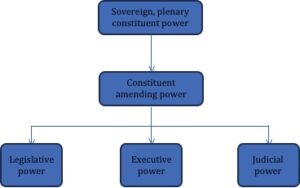
There was once a time when it was thought that the major issues concerning a judiciary were matters of independence, tenure, the appointment process and the questions performing the integrity. These matters no doubt continue to obtain but no one can ignore these changes in emphasis that has taken place in recent times.
The three organs of the Indian government – Legislature, Executive and Judiciary perform three essential functions of rule-making, rule application and rule adjudication respectively. The main principle behind this formulation is separation of powers: which brings accountability, keeps the government restrained and in this way our rights and liberties are safeguarded. In fact the main driving force behind this is based on the simple saying that ‘power corrupts man and absolute power corrupts absolutely’. But given the increase in the rate of corruption charges one can’t help but ask the question ‘who is judging the judges?’ There is another principle working together with the separation or balance of power i.e., checks and balances.
The main argument which propends the current judicial system against the question of accountability is of the independence of judiciary. The independence of judiciary is another important concept which should be studied together with the concept of accountability. And since the judiciary is the public institutions, which is for the people, it should be accountable to the people. And work according to the provisions of the constitution, keeping an eye on the preamble which is the soul of the constitution.
INDEPENDENCE OF JUDICIARY:
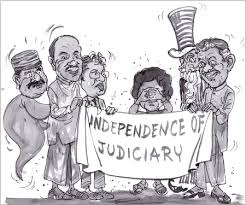
Independence is a bulwark of rule of law. If law is to be applied equally to all citizens in the country, then it is equally important that the judges should be independent in applying law and rendering judicial decisions. So for giving a sound, lucid and unbiased decision umpires should be free from any kind pressure from litigants, cabinet ministers, influential personalities, big corporations, rich businessmen and also criminal elements of the society.
Independence of judiciary is needed because:
- Judiciary is the watchdog of Indian Constitution and it checks the functioning of other organs of the government.
- The judiciary plays a vital role in interpreting the provisions of the constitution and it is important that such interpretation is unbiased ad free from any sort of pressure from the executive or legislature.
- The judiciary is expected to deliver impartial justice. This is what makes it the most important organ of the government. It is important that the judgements are not influenced by any sort of political inflictions.
Independence of judiciary concept has however faced many criticisms and problems when it comes to appointment and transfer of judges. It is important that Judicial Independence and Judicial Accountability co-exist and go hand in hand in order to maintain harmony in the judicial system. Article 235 of the Indian Constitution gives power to the High Courts over subordinate courts, thus establishing a perfect example of judicial independence.
The problem actually lies in the understanding of independence; it should be understood as independence from executive and legislature and not independence from accountability.
JUDICIAL ACCOUNTABILITY:
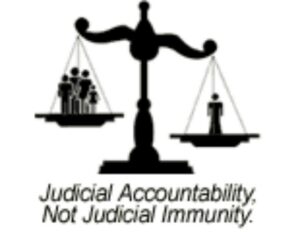
Judicial accountability is in fact a corollary of the independence of the judiciary. Simply put, accountability refers to taking responsibilities for your actions and decisions. It generally means being responsible to any external body; some may insist accountability to principle or to oneself rather to any authority with the power of punishment or correction.
Judicial accountability brings about transparency and it can only be achieved if the accountability is ensured and corruption in the system is brought to a stop. Many questions arise as to what has gone wrong with the system. Pt. Nehru has said in a statement, “Judges of the Supreme Court sit on ivory towers far removed from ordinary men and know nothing about them.” Judges are also humans after all and can make errors any time. So how can one achieve accountability in such a system?
ISSUES IN MAKING THE JUDICIAL SYSTEM ACCOUNTABLE:
- IMPEACHMENT
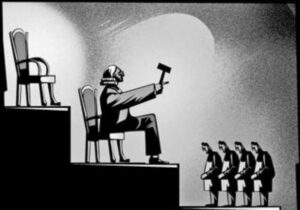
Article 124(4) of the Indian Constitution specifies the process of impeachment that is removal of a judge of Supreme Court on the grounds of proven misbehaviour or incapacity. This is the only possible and available mechanism in the judicial system of making the higher judiciary accountable for their actions. In the procedure for removal or impeachment of the judges, a resolution must be passed in each house of parliament by the total majority of members of the house and not less than two-thirds majority of the house present and voting. The process must take place in a single sitting. The resolution has to be presented before the president for his approval.
No judge has been impeached till date. However this does mean that there is no corruption in the system. The whole impeachment process is considered to be a failure as it is so lengthy and clumsy.
- CORRUPTION IN JUDICIARY

Judicial corruption includes dishonest use or ‘misuse’ of judicial powers by the court authorities leading to unfair and unjust judgements. Due to corruption in judiciary, the public is deprived of the right to fair trial and right to equality. India is the world’s largest democracy. Indian judicial system plays the important role of checks and balances over the executive and the legislature. However, corruption in Indian judiciary is a major threat and it largely diminishes judicial accountability. Citizens need to have faith that the country’s judiciary will provide them justice and equal protection by law. Here are some cases showing how corruption has crippled Indian judiciary:
Justice K. Veeraswamy’s case
Justice K. Veeraswamy was the chief justice of Madras High Court. A case was filed against him by the CBI under Prevention of Corruption Act, charging him for possession of assets inconsistent with his income sources. The Madras High Court referred the case to the Supreme Court for dealing with important issues of law. The Supreme Court laid down some stern guidelines for the protection of judicial independence.
- No F.I.R. can be registered against a Judge or Chief Justice of the High Court, or a Judge of the Supreme Court without the sanction of the Chief Justice of India in the matter.
- It was held that the Supreme Court is not a court of limited jurisdiction of only dispute settling, and that the court has been a law maker and it is the courts responsibility and duty to apply the existing law in a form more favourable to the independence of the judiciary.
- It was also said that any complaint against a Judge and its investigation by the CBI, if given publicity will have a far reaching impact on the judge and the litigant public therefore there is need of a judicious use of taking action under the Prevention of Corruption Act.
The Supreme Court’s judgement in this case has been criticized on the ground that this is sheer misuse of judicial independence and it completely overlooks the concept of judicial accountability. It provides an unfair shield to the judges for arbitrary behaviour and use of judicial powers.
Sexual Harassment Cases:

A retired Supreme Court judge and former Chief Justice of the Orissa High Court, Judge AK Ganguly was accused by a woman intern for sexually harassing her. He was found guilty by the three judge committee even though he continually denied all allegations. He resigned from the West Bengal Human Rights Commission in 2014.
Such cases of gross misconduct on behalf of higher judiciary judges are a shame for the Indian Judiciary. High court and Supreme Court judges that are supposed to provide justice to the society are themselves involved in such criminal activities is highly unfortunate. They must not be given the immunity from proper criminal proceedings. They must be tried like any other offender. If such cases keep on rising then there would be no accountability left in the judiciary.
- CONTEMPT OF COURT
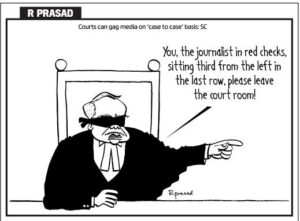
In a democracy, the people have the power. And the government bodies or judges, courts etc. are public servants or servants of people. Now, the power of contempt is given to the judges to allow the smooth functioning of the judiciary. However, that does not deprive the right of people of freedom of speech. They can criticize the judges all they want.
Article 19(1)(a) gives the right to freedom of speech and expression to the people. But article 129 and 215 give the contempt powers to judges and limit the rights of people. Contempt is generally defined as an act that critically harms the dignity of the court and lowers its authority. There can be two types of contempt: Civil and Criminal.
- RIGHT TO INFORMATION (RTI) AND JUDICIARY
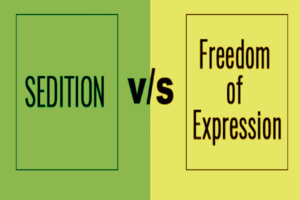
However the Indian judiciary has shown some serious hypocrisy and double standards about practicing Right to Information. If the Right to Information Act is applicable to the legislative and the judiciary, then how is the judiciary exempted from its provisions? Why does judiciary get special treatment?
The double standards of courts can be clearly seen after the Right to Information Act has been enacted. The RTI Act clearly applies to the judiciary that is court officials or judges as they are also included under the definition of public servants.
The judiciary will always play the card of judicial independence to escape judicial accountability which cannot be tolerated.
- JUDICIAL ACTIVISM OR JUDICIAL OVERREACH?
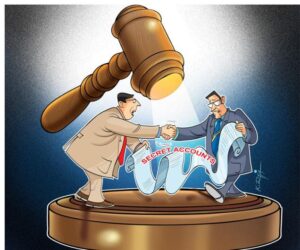
Judicial activism has recently been seen trespassing its limits and turning to judicial overreach. Judicial intervention in matters of labour policy, ecological and environmental policies, fiscal policy etc. tends to look like judiciary oversteps its authority and interferes with the functioning of the legislature and executive. This is called judicial overreach. Justice JS Verma once stated, “Judicial activism is appropriate when it is in the domain of legitimate judicial review. It should neither be judicial ‘adhocism’ nor judicial tyranny.”
It is essential for the smooth functioning of democracy that the difference between “judicial activism” and “judicial overreach” is clearly recognized. The lack of accountability requires judiciary to step back and restrain in its activities.
- APPOINTMENT OF JUDGES
Over the course of three judge’s cases the court evolved the concept of judicial independence to mean that no branch of state, that is, executive or the legislature will have any say in the appointment of judges. The court created the collegium system and put it in function giving exorbitant powers to the senior judges to select and refer the appointments to the government. This whole process is arbitrary as it leads to political favouritism when the appointments are in hands of the executive and judicial overreach when they are in hands of the judiciary.
SOLUTIONS TO PROBLEMS

- FORMATION OF NATIIONAL JUDICIAL COMMISSION (NJC)
The 80th and 121st Law Commission Reports of India have made the suggestion to form NJC. It is supposed to consist of 5 members:
- One member nominated by all the Supreme Court judges
- One member nominated by the Chief Justices of the High Courts
- One member nominated by the cabinet of ministers
- One member nominated by the speaker and the Leader of Opposition of both the houses
- The last one member nominated by Chief Vigilance Commissioner of the Central Vigilance Commission (CVC), Comptroller and Auditor General (CAG) and the Chairperson of the National Human Rights Commission (NHRC)
The NJC shall have its own investigative mechanism that shall investigate in the matters of removal of judges. Also the NJC will select the judges for appointment in HC and SC, the information of which will be available to the public. In this way the independence of judiciary is maintained and its accountability to the public too.
- JUDICIAL ACCOUNTABILITY BILL
The bill was introduced in Lok Sabha on December1, 2010.
1968-The bill shall lay down judicial standards and provide for accountability of the judiciary. It will establish certain mechanisms to investigate the complaints made against the judges individually. Also, it shall provide a mechanism for the removal of judges. It will replace the old Judges Inquiry Act
1969-A five member commission shall be appointed by the president of the recommendation of the prime minister and its cabinet of ministers including the leader of opposition and a minority member.
1970-Declaration of assets of judges’ shall be made mandatory.
1971-When a complaint is received against the judges, it shall go to the investigating committee. If the charges are serious then the committee can ask the judge to resign, and if he refuses the case will move forward towards the process of removal.
1972-All the investigation proceeding information shall be made available to the public.
- JUDICIAL RESTRAINT (NEED OF THE HOUR)
It is important for the judiciary to practice judicial restraint for maintaining the balance between the different organs of democracy. The courts must be concerned with legality and law. Extreme judicial activism can raise questions on its accountability. Curbing judicial activism is required as the judiciary cannot start performing the functions of other organs which shall be totally against the principle of separation of powers. The benchmark of an independent judiciary has been its exclusion from the political and administrative process. Judges must not act like legislators or administrators.
- AMENDING THE CONTEMPT OF COURT ACT
The Contempt of Court Act has a lot of loopholes and it gives arbitrary powers to the judiciary. Few suggestions for the amendment were made. The accused must be provided with a reasonable opportunity to defend himself. The contempt cases should not be tried by courts but by independent commissions. The Act must make changes to the definition of criminal contempt so that it does not infringe the rights of the people.
CONCLUSION
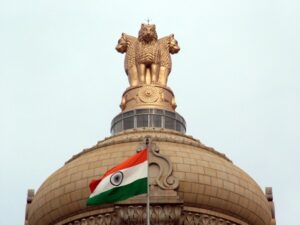
The time has come when the judicial independence needs to be interfered with. Judicial independence must go hand in hand with judicial accountability. It is important to acknowledge the fact that the judiciary is not appointed by the people directly. Thus its accountability is questionable. The main task of judiciary is to provide fair trial and speedy justice. It is the organ that protects the society from injustice. It is only through this that the public can acknowledge its accountability.
This does not mean that the judiciary has failed completely. If the solutions to the problems are entertained and show a green light then proper functioning of judiciary and judicial accountability can definitely be ensured.
By –
Taniya Mirza
BA LLB (Hons.)


